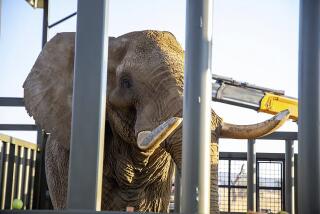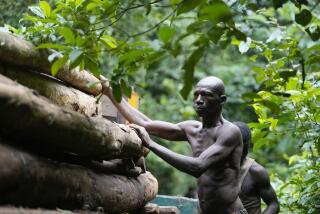South Africans Swap Livestock for Wildlife
- Share via
AMAKHALA GAME RESERVE, South Africa — Squinting into his binoculars, William Fowlds scans a vast, grassy plain where a busy dairy farm once stood.
The cattle have given way to herds of grazing antelope. Out of a knot of thorny bushes, a family of elephants emerges.
For well over a century, farmers like Fowlds -- a noted storyteller known to all as Uncle Bill -- have forged a living from the rugged and arid land of South Africa’s Eastern Cape. But years of drought, stock theft and low prices have taken a toll.
Now, a growing number are trading their livestock for wildlife, hoping to cash in on a boom industry: game viewing.
Fowlds’ forefathers used to hunt elephant, cheetah and hyena to protect their farms. Now that big game is back, “even the rabbits look at us like we are bloody mad,” Fowlds said with a chuckle, as he poured himself a whiskey and took a seat by the campfire.
The amount of private land dedicated to wildlife ventures like breeding, viewing and hunting has increased steadily throughout South Africa -- up to 25% a year in this region alone, according to research conducted by the Nelson Mandela Metropolitan University in Port Elizabeth.
Bit by bit, land subjected to decades of bush clearing, overgrazing and invasion by alien vegetation is reverting to its natural state. Wild grasses and bushes are sprouting in dusty eroded pastures, and animals that were hunted nearly out of existence are making a comeback.
Environmentalists worry, however, that the spread of private parks has gone largely unregulated, guided by economics rather than conservation.
“I think it is a very positive trend if we are moving away from agriculture ... which is very destructive for soil and habitats,” said Jason Bell-Leask, regional director of the International Fund for Animal Welfare. “But are we conserving wildlife ... or are we actually starting to farm these animals?”
Fowlds’ reserve offers viewing only, but researchers say hunting lodges are spreading at an even greater pace in a region where tourists from Europe and the United States will pay more than $2,000 to shoot a single waterbuck. Bell-Leask worries the trend could be fueling “canned hunting” -- the release of captive-bred animals to be shot in small enclosures.
There is also concern about the number of wild animals brought in that are not indigenous to the Cape. Owners stock the species that tourists want to see, purchasing them from national parks and private breeders throughout the country -- including the famous Kruger Park, more than 600 miles away.
Farming is tough in South Africa. Rainfall is erratic and the costs are rising. Sheep farmers are getting about the same price for their wool as they did nearly 20 years ago, and many have been forced to sell.
After farming at a loss in 1995, Fowlds stood one morning before the framed family tree in a hallway lined with old black-and-white photographs and decided he would not be “the idiot who lost the farm.” Like his ancestors who came from Britain in 1857, he had to “adapt or die.”
Down the road, businessman Adrian Gardiner had been buying up rundown farms and in 1992 opened Shamwari Game Reserve. The five-star, 49,000-acre spread dedicated to conservation has helped put the Eastern Cape on the map as a destination for wildlife viewing.
Fowlds decided this was the way to go, and within a year, three other families had joined forces with him.
In 1999 he and his son opened Amakhala Game Reserve, near the coastal city of Port Elizabeth. The 17,000-acre reserve has zebra, buffalo, giraffe, rhino, cheetah and elephants.
But it’s a costly venture. A single black rhino costs $77,000. The old farm structures must be torn down, fences electrified, accommodations built and marketing done.
Amakhala’s first game drives were conducted by farmers in the back of pickup trucks.
“You had to drive through the cows and sheep to get to the zebras,” said Rod Weeks, Fowlds’ partner and neighbor.
Amakhala has safari wagons driven by professional rangers, river cruises and an environmental research center. Accommodations range from colonial farmhouses to thatch-and-stone lodges.
The Fowlds say that despite the debts they have run up, they have doubled their workforce and improved salaries at a time of mounting joblessness.
Nomonde Mayinje grew up on their farm, where her father was a sheep shearer. She sought and failed to find employment in the city, but came back to work in the kitchen when the reserve opened.
“It is a future for me and my child,” said the single mother. Her 18-year-old son is now thinking of becoming a game ranger.
“One day, he could be manager,” she said proudly.
More to Read
Sign up for Essential California
The most important California stories and recommendations in your inbox every morning.
You may occasionally receive promotional content from the Los Angeles Times.













